- Home
- Catherine Jinks
Theophilus Grey and the Traitor's Mask Page 11
Theophilus Grey and the Traitor's Mask Read online
Page 11
‘An Inquiry into the Causes of the Late Increase in Robbers, with some Proposals for Remedying this Growing Evil, In which the Present Reigning Vices are impartially Exposed, and the Laws that relate to the Provision of the Poor and the Punishment of Felons are largely and freely examined.’ Mr Fielding sipped his tea and smacked his lips, as if he were savouring his own words. Then he turned back to Philo and said, ‘Speaking of distilleries, you saw what happened to poor Mr Bradley’s house?’
Philo nodded.
‘He has fire insurance, by a mercy. Still – ’twas a sad misfortune.’ Mr Fielding regarded Philo with narrowed eyes. ‘I hear you witnessed the conflagration.’
Philo blinked. ‘Sir?’
‘As did another linkboy. Someone by the name of John Davis.’ Seeing Philo knit his brows, Mr Fielding added, ‘You may know him as Crab Jack.’
Philo stiffened. He couldn’t tell where this was leading. ‘Aye, your honour,’ he replied cautiously, through a mouthful of oatcake. ‘Crab Jack was where he shouldn’t have been. He belongs to a riverside crew.’
‘And you thought his behaviour suspicious?’ Mr Fielding asked. ‘Suspicious enough to warrant a reckoning?’
‘Your honour—’
‘Last night a watchman came upon Crab Jack, who was in a state of great distress. The poor lad had been all but drowned in a barrel of porter.’ Mr Fielding studied Philo with a detached expression, looking every inch a magistrate. ‘Richard Norris did it. And threatened to set him alight with his own link, besides.’
Philo didn’t know what to say. So he remained silent, his stomach knotting and his cheeks reddening.
‘I questioned Norris,’ Mr Fielding continued. ‘He said that he belaboured Crab Jack on your recommendation.’
‘Indeed he did not!’ Philo exclaimed. It wasn’t a baldfaced lie, though he felt a twinge of guilt as he remembered his talk with Richard Norris. ‘All I did was tell him that Crab Jack ran with river pirates! I thought he ought to know …’
‘Lest Crab Jack be working with a tinny hunter?’
‘Aye, sir.’
‘Hmmm.’ Mr Fielding didn’t sound convinced. He drained his dish of tea, then set it down. ‘I hope this was not a ploy to disgrace one of your rivals,’ he remarked sternly. ‘I should hate to think that you resorted to such schemes, for you’ve no need of ’em.’
‘Sir—’
‘Your reputation is valuable currency, boy. Don’t sell it cheap.’ Before Philo could defend himself, Mr Fielding added, ‘I shall give no one in charge for this offence, since Crab Jack is too poor to prosecute. Norris is a staunch fellow, who was concerned only for his master’s welfare. And you, I dare swear, had no great mischief in mind.’ He cleared his throat and picked up his book. ‘Now,’ he said. ‘What do you have for me today?’
Philo took a deep breath. Though his conscience was troubling him, he tried to ignore it as he assembled various facts in his head. Mr Fielding was always interested in Sunday men, so Philo began his report with an account of his team’s discoveries the previous Sunday. They had spotted a highwayman called Hulks Doughty, who had gone to ground six months earlier in the parish of St Andrew’s, but who was now hiding near Soho Square. They had also seen a footpad who was wanted on a murder charge. And in Lewknor’s Lane they had spied a pickpocket who had escaped from the Holborn watch house two weeks earlier.
Mr Fielding made a note of all this in his little book. He then went on to record everything else that Philo told him: about possible tinny hunters spotted by Barnabas Holt, about the drunken ostler seen beating his wife in Craven Mews, about someone who had walked into an apothecary’s shop and bought nitric acid and cream of tartar – substances commonly used by counterfeit coiners. Philo gave Mr Fielding everything he had that didn’t involve a reward, and when he’d finished, he asked the magistrate if there was anything else he wanted to know.
‘I should very much like to know who committed the murder on the road to Windmill Hill,’ Mr Fielding replied, closing his book. ‘Though it happened near Finsbury, I’ve a notion the culprits might live hereabouts. If you hear aught of the matter, you should tell me at once.’
‘Aye, your honour.’
Mr Fielding reached under his coat and produced half a crown. ‘Here,’ he said, laying the coin in Philo’s hand. ‘Pass me those crutches.’ As Philo obeyed, Mr Fielding heaved himself to his feet. ‘Now run along and I’ll see you next Sunday.’
‘Aye, sir. Thank’ee, sir.’
‘Oh – and Philo?’
Philo paused on his way out. ‘Aye, your honour?’
‘I’ve enough street-fights to contend with.’ Mr Fielding lifted his crutch and pointed it straight at Philo’s chest. ‘The last thing I need is a war between linkboys. Do you understand?’
Philo was about to protest, then thought better of it.
‘If any more glim-jacks come to harm, I’ll know where to start my inquiries,’ the magistrate continued, skewering Philo with a stern look.
Though Philo bristled, he knew better than to argue. Instead he changed the subject.
‘An’ it please you, sir – could you tell me what hour it is?’
‘What hour?’ Mr Fielding echoed. He raised his eyebrows, then consulted his pocket watch. ‘’Tis a quarter after one,’ he said.
‘Oh!’ Philo was startled. ‘Forgive me, your honour, I must go – I’m expected – I’ve an appointment …’ He was, in fact, due at Mrs Cowley’s, having promised to be there at one. As he raced outside, it occurred to him that a late start might mean no start at all.
The prospect didn’t trouble him much. He was still having second thoughts about working with Mrs Cowley. On his way to her lodgings, he rehearsed the excuses he was going to make for being so tardy, wishing that he’d never agreed to show up. This is the last time, he told himself. The very last time. He had made a promise, and he intended to keep it. But he would make no more.
Grey clouds were gathering as he approached Windsor Court. The air was very humid. But it was still dry by the time he reached Mrs Cowley’s house, where the stationer on the ground floor was absent-mindedly cutting quills, staring out the window.
Philo greeted him with a nod, then climbed the stairs to Mrs Cowley’s rooms. When he finally crossed her threshold, he found her dressed as a laundress, in an apron and a short gown covered in bleached patches. Her hair looked lank and greasy. There were lye-scars on her neck. Her sleeves were tied up, exposing reddened arms and hands that had become strangely rough.
‘Gum coarsened with pumice stone,’ she remarked, on seeing Phil stare at them. ‘And the scars are made of wax. You’ll need no such device, yourself – those burns of yours will work in our favour.’
Philo eyed her uneasily. ‘Why?’ he asked. ‘What do you want me to do?’
‘I want you to hide in a court cupboard at the Earl of Westmoreland’s house,’ Mrs Cowley replied. ‘I want you to listen to what’s said at dinner, and report what you hear to Mr Bishop.’
Philo’s jaw dropped.
‘There’s a guinea in it for you. A guinea, Theophilus!’
‘I cannot.’ Philo shook his head, backing away from her.
‘You can.’ The actress grabbed his arm. ‘I know that house. I’m friendly with the coachman. If I was smaller and thinner, I’d do this myself, but I cannot. You must.’
‘They’ll see me!’ Philo protested. ‘I can’t walk into the Earl of Westmoreland’s dining room without being seen!’
‘Even if you are seen, it won’t signify,’ Mrs Cowley assured him, with absolute confidence. ‘For you’ll be dressed as a housemaid. And no one ever looks at housemaids – they might as well be ghosts.’
Then she pulled a petticoat off the nearest chair and waved it at him, laughing at the horrified expression on his face.
HOW PHILO
PAID A CALL ON THE
EARL OF WESTMORELAND
Hanover Square was a long way from Windsor Court. But Mrs Cowley insisted o
n walking the entire distance. She claimed that a laundress couldn’t possibly be seen hiring a carriage or a sedan chair. ‘One must inhabit one’s role,’ she reminded Philo, ‘or people might wonder why a servant should be spending money like a duchess.’
Luckily, the length of the trip gave her plenty of time to explain her plan, which involved entering the Earl of Westmoreland’s residence through the coach-house. ‘I’ll be playing cards with the coachman in his room over the stables,’ she said, putting on a broad St Giles accent to match her appearance, ‘so you’ll have the run o’ the horse-stalls. From there, if you walk across the garden, you’ll reach the back door, which leads straight to the front. You’ll find the dining room behind the second door to the right.’
‘Aye, but—’
‘Housemaids always hurry. They skitter about like rats. No one’ll think to waylay you.’ Mrs Cowley nodded at the basket that was hanging from the crook of her arm. ‘I’ve linen here. A housemaid carrying a tablecloth is the most common sight in the world. And the earl has six housemaids – six! Why would anyone look at you twice? You’re every inch a drudge.’
Philo wasn’t so sure. Though he wore a petticoat over his breeches and a muslin cap over his pinned-up curls, he wasn’t convinced that he could pull off such a ruse. Mrs Cowley had assured him that he could. She had pointed out that his clothes smelled convincingly of beef tallow. She had instructed him to take shorter strides. And she had warned him not to draw attention to his hands.
‘They’ll be big one day, and it shows,’ she’d said. ‘And though your face is tender enough, I’d wish it had more flesh on it. So you should keep your head down and your hands covered. If you do that, you’ll have no difficulty getting in. And getting out will be simpler, since you’ll not be a dozen steps from the front door.’
Philo wasn’t convinced. But he’d learned not to argue with Mrs Cowley, who had a way of turning all of his arguments upside down. So he’d grimly obeyed her, reminding himself that he’d given his word, and that a guinea was at least a month’s wages for the average linkboy.
This is the last time, he thought. The very last time.
Their destination lay a good mile down Oxford Street, past the Blue Boar and Soho Square, past timber yards and market gardens and row upon row of handsome new houses. The road went on and on – Philo couldn’t believe how endless it was, or how many carriages passed them as they trudged along under a lowering sky. Philo had a horrible feeling that he would be walking home in the rain.
‘Have you ever been to Tyburn?’ Mrs Cowley asked him, peering towards a faint smudge of green in the distance.
Philo shook his head. He knew that the Tyburn gallows stood at the very end of Oxford Street. Whenever anyone was hanged, he would see hordes of people heading in that direction. But he’d never bothered going himself. People who did go usually had their pockets picked, their toes crushed and their view blocked by hundreds of other people.
‘Take care you avoid the place,’ said Mrs Cowley. ‘For you’ll not enjoy it.’
Philo grunted. He was finding it hard to concentrate because he kept tripping over his skirts. He was also very conscious of his exposed forearms. Surely someone would notice that he wasn’t female? It seemed blindingly obvious to him. Yet people kept passing by without a second glance.
The only comment he received was from a drunken stonecutter sitting on a tavern doorstep, who called him a broomstick and laughed like a drain.
‘A Tyburn audience is the envy of every theatre in London,’ Mrs Cowley muttered. ‘And there’s some managers in the business who would gladly execute actors, to raise their takings …’
By this time they had entered a neighbourhood so wealthy that it was littered with oil-lamps. The streets were wide and clean, the houses tall and new. When Mrs Cowley turned left, Philo found himself confronted by a square as big as Covent Garden, though not so cluttered with carts and stalls. In its centre was a fenced expanse of grass, around which lay a freestone promenade, paved and swept and ringed by a wall of huge townhouses.
All of these houses were four storeys high, and so well-supplied with windows that Philo cringed at the thought of the window tax.
‘Hanover Square,’ said Mrs Cowley. Then she swung towards the square’s north-west corner, where a street led past the towering flank of number sixteen. Behind this enormous house, a gate opened onto a narrow mews lined with stables.
Mrs Cowley had a key to the gate.
‘This key cost me dearly,’ she told Philo, as she ushered him into the mews. Two rows of well-kept coach-houses faced each other across a cobbled lane. Above them were servants’ quarters, as well as the odd hayloft. Several bales of straw had been dumped near a water butt. A rake was leaning against a wall, and a battered pair of boots stood beside a leather pail. But there was no one about.
Mrs Cowley headed for one of the coach-house doors, moving with complete confidence. Looking at her raised chin and easy saunter, Philo marvelled at how well she fitted in – as if she’d been born and raised within spitting distance.
‘Take these,’ she murmured, pausing to thrust a pile of linen into Philo’s arms. ‘I’ll leave the door unlatched. Listen for my signal. When you hear it, come straight in and head past the horse-stalls. There’s a door on the other side.’
‘What will your signal be?’ asked Philo, disturbed all over again by Mrs Cowley’s dragging vowels and missing consonants. It was so strange to hear her talking in someone else’s voice.
‘Listen for a loud squeal,’ she replied. Catching Philo’s sidelong glance, she quietly added, ‘This coachman’s a rare one for pinching and kissing. When we’re safely upstairs, I’ll let him know how I feel about that.’
Philo nodded. Mrs Cowley had already assured him that he had nothing to fear from the rest of the stablehands. The ostler had a free afternoon, and would spend it asleep. As for the stable-boy, he was always needed in the kitchen when the Earl had guests for dinner.
‘Once the dining room empties, you’re to walk straight out the front door,’ Mrs Cowley concluded. ‘Don’t run, but don’t dawdle. Look busy.’ Seeing Philo grimace, she patted his cheek. ‘I’ll wait in the square. If aught goes amiss, I’ll create a diversion. I’m a dab hand at that, as you know.’
Philo licked his dry lip nervously. Glancing up and down the empty mews, he had to clear his throat before asking, ‘What if I’m seen waiting?’
‘Look bored. Do not avoid anyone’s eye.’ Mrs Cowley studied him for a moment. ‘Courage,’ she said. ‘I know you’ll do me proud.’
Then she bustled away, disappearing into the Earl of Westmoreland’s coach-house. Philo was left staring after her, feeling abandoned. His heart was racing. His skin was damp. Cradling his linen, he kept his ears pricked for Mrs Cowley’s signal, reviewing all that she’d told him about the Earl of Westmoreland’s dining room. The table would be laid, she’d said. At one end of the room, under a mirror, he would see a low cabinet with country scenes painted on its doors. This was the court cupboard. Its varnished top would be used during the meal, but the space underneath it would remain undisturbed.
‘There’s naught in it but clean linen, and little enough o’ that,’ Mrs Cowley had explained. ‘Since the cloth will have been laid, no one will have cause to trouble you. All you need do is remain silent.’
Philo felt sick at the thought of what might happen if he sneezed. I never should have agreed to this, he thought desperately. This is pure madness.
Suddenly he noticed someone emerging from a coachhouse further down the mews – a wizened little man in a leather apron. The man turned to peer at Philo, who stiffened and tried to look calm.
Then the sound of a raised voice reached his ears. It was Mrs Cowley’s signal.
Without a moment’s hesitation, Philo slipped through the door behind him, plunging into a space so dark that he couldn’t see a thing. He could hear things, though: the clink of steel on stone, the snort of an animal, the murmur of voices fr
om somewhere above his head. He could smell things, too. Horses. Oats. Hay.
As his vision cleared, he cautiously advanced. The flagstones underfoot were strewn with straw, which muffled his tread like a carpet. Ahead of him lay a sliver of light. The way out was exactly where Mrs Cowley had said it would be, opposite the way in. He could vaguely make out the shape of an iron latch.
Somewhere in the shadows a horse stamped and whinnied, disturbed by Philo’s presence. He held his breath, but nothing happened. The voices kept murmuring. The door in front of him remained shut.
Now, he told himself. Go now!
He clenched his teeth as he lifted the latch, which didn’t make a sound. But hinges creaked when he pulled open the door. Afraid that this noise would alert the coachman, Philo stepped boldly out into the light.
He found himself in an enormous garden. There were hedges, paths, seats, a sundial and an avenue of fruit trees. There were tresses and flowerbeds. On either side, the plot was bounded by high brick walls. And at the far end stood the Earl’s house – number eighteen – with its row upon row of gleaming windows, its looming chimneys and white paintwork. Three of its doors opened onto the garden, but only one looked like a servant’s entrance.
Philo knew that someone inside the house might be staring straight at him. So he kept his head down as he headed for the likeliest door, moving briskly, his petticoat trailing along the gravel path. Crunch. Crunch. Crunch. Every footstep seemed as loud as a church bell.
It wasn’t until Philo reached the back door that he heard the distant sound of pots clanging. He realised that it must be coming from the kitchen downstairs.
‘Move those onions, damn you!’ a muffled voice roared.
The back stairs had been built next to the back door. They smelled of soap. Beyond them lay a narrow passage, and beyond that, as promised, was the entrance hall. It was as white as an egg, with a chandelier and a sweeping staircase and gold-framed mirrors the size of small barges. Philo’s heart seemed to flutter like a bird in the cage of his chest as he moved across a chessboard floor, counting the doors to his right.

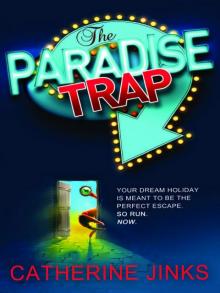 The Paradise Trap
The Paradise Trap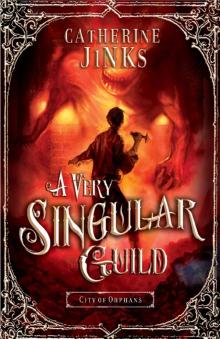 A Very Singular Guild
A Very Singular Guild Eloise
Eloise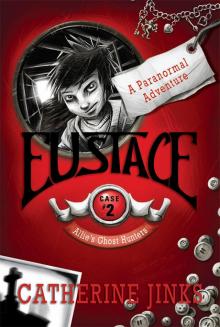 Eustace
Eustace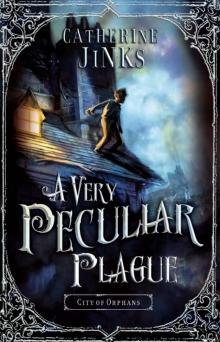 A Very Peculiar Plague
A Very Peculiar Plague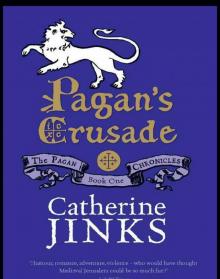 Pagan's Crusade
Pagan's Crusade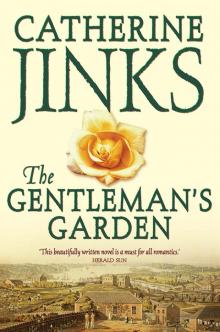 The Gentleman's Garden
The Gentleman's Garden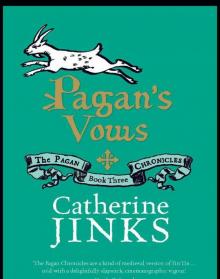 Pagan's Vows
Pagan's Vows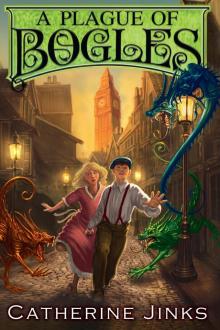 A Plague of Bogles
A Plague of Bogles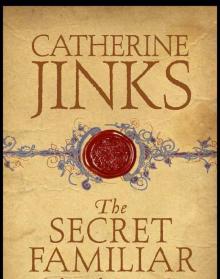 The Secret Familiar
The Secret Familiar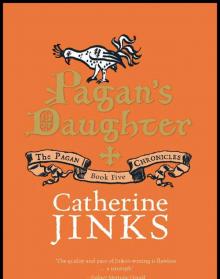 Pagan's Daughter
Pagan's Daughter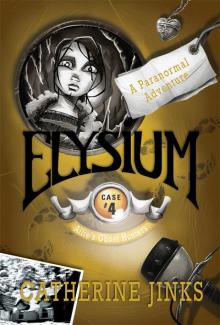 Elysium
Elysium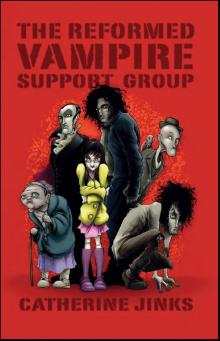 The Reformed Vampire Support Group
The Reformed Vampire Support Group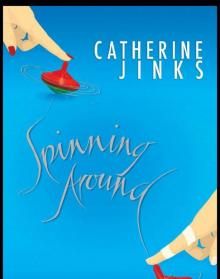 Spinning Around
Spinning Around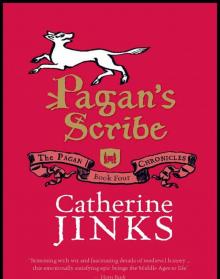 Pagan's Scribe
Pagan's Scribe Evil Genius
Evil Genius Pagan in Exile
Pagan in Exile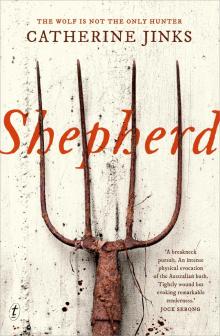 Shepherd
Shepherd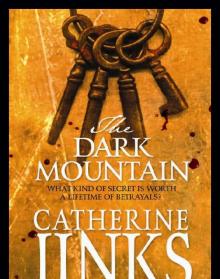 The Dark Mountain
The Dark Mountain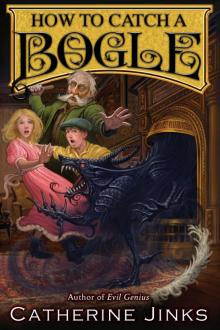 How to Catch a Bogle
How to Catch a Bogle Saving Thanehaven
Saving Thanehaven The Genius Wars
The Genius Wars The Abused Werewolf Rescue Group
The Abused Werewolf Rescue Group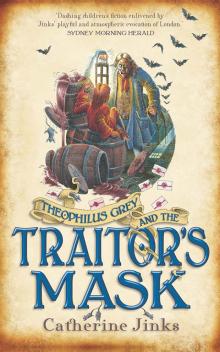 Theophilus Grey and the Traitor's Mask
Theophilus Grey and the Traitor's Mask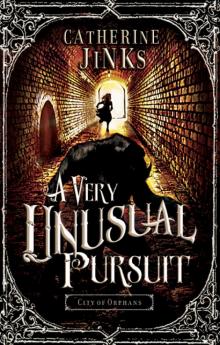 A Very Unusual Pursuit
A Very Unusual Pursuit Genius Squad
Genius Squad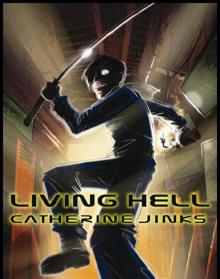 Living Hell
Living Hell The Road
The Road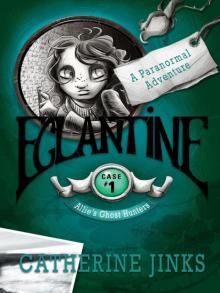 Eglantine
Eglantine